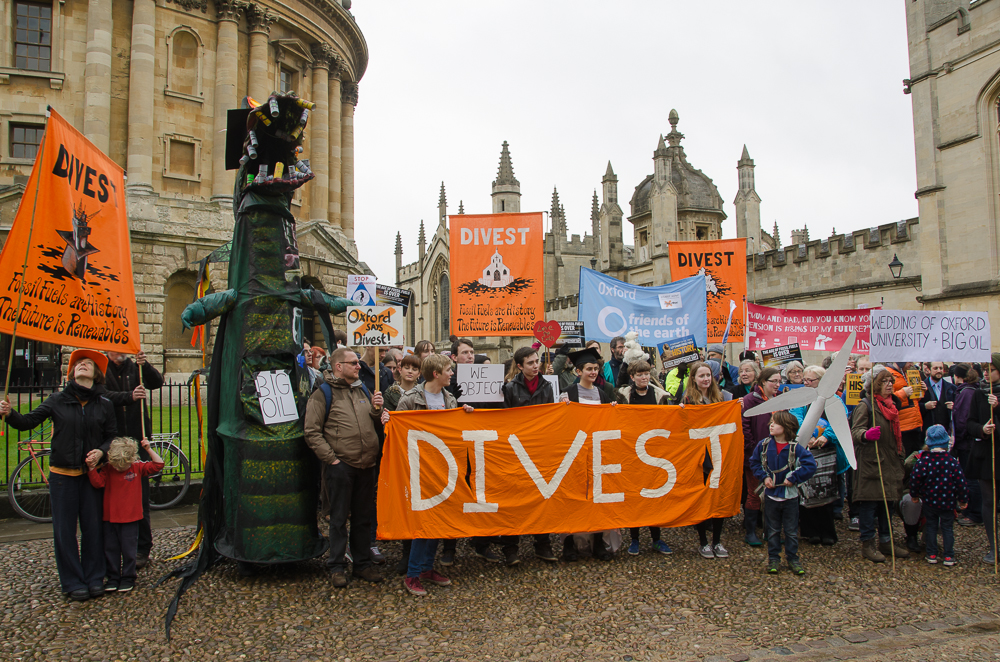Oxford and Cambridge are failing to keep pace with newer, more sustainable, universities as the divestment movement gathers pace.
Student activist group People and Planet this week announced that 16 more universities will no longer invest in fossil fuel companies. That brings the total number of universities that have divested up to 43; a quarter of all UK universities.
Eleven institutions including Nottingham Trent, Kent and Lincoln committed to divest fully from all fossil fuels. A further five including Goldsmiths and Sussex have pledged to divest from just coal and tar sands.
The announcement was made alongside the launch of People and Planet’s updated university league table, which ranks institutions by how environmentally friendly they are.
Old Versus New
With mainstream politics failing to represent their views , there is an increasing trend towards more direct action among young people.
The divestment movement has been gathering pace in recent years, driven by the support of students who pay thousands of pounds to study each year, and have a significant stake in the roles their universities play in tackling climate change.
Tuesday’s announcement shows the divestment movement’s momentum is growing, and the impact that fossil fuels have on climate change is not going unnoticed by students.
The university league table rates universities on their environmental and sustainability efforts, judging them on 13 metrics including, for example, ethical investment.
Only one of the top 10 universities is from the prestigious Russell Group, with the majority being newer institutions established after 1992.
That could partially be down to differences in the universities’ finances, Nottingham Trent’s environmental manager, Grant Anderson, suggested.
“It’s only really the traditional red brick universities that have big endowment funds to invest, so for us it was a relatively easy thing to ensure the money we have will not be invested in fossil fuels”, he said.
Some smaller universities also struggle to direct their resources towards being more sustainable. For instance, Trinity Laban Conservatoire of Music and Dance, a university with just under 1000 students, is the lowest ranked university on the list, in 150th place.
John Fosbrook, head of communications at Trinity Laban, puts this down to the university’s relatively scant resources. “You can see a split between bigger universities and smaller ones as we wouldn’t be so big as to have dedicated sustainability staff”, he told DeSmog UK.
The Royal Agricultural University bucks this trend, coming 16th on the list despite having only 1,250 students.
Competing to be Green
This is the 10th year the university league table has run, and there is now an element of competition emerging between the universities.
Andrew Taylor, campaigns and communications manager at People and Planet told DeSmog UK:
“The university league is a big driver of change in the sector and I think universities are trying to be the top performers on sustainability.
“We’re also starting to hit that snow-balling critical mass where the more universities that have divested the more it’s becoming normal to do that, so it’s not as big a decision for a university to take. I think there is safety in numbers.”
This year’s Nottingham Trent University was top of the table, and has consistently scored highly.
The university did well on environmental policy and sustainable development education. It has completely divested from fossil fuels and since 2001 have spent £1,098,434 in funding research into the renewables industry.
Nottingham Trent 3rd year student, Andrew Burdett, said: “It’s so important to divest from fossil fuels because it’s actually going to make a difference to the environment.” As a lot of young people care about the environment, being top of the league table “could attract more people to the university in the future”, he suggested.
Big Universities Failing
Major names such as Oxford and Cambridge are conspicuously absent from their usual spot at the top of the table, and can be found much lower down at 46 and 57 respectively.
Earlier this year Cambridge University rejected calls from students and high-profile alumni to divest from fossil fuels.
Cambridge geography student and fossil fuel divestment campaigner Alice Guillaume told DeSmog UK, “I think that as a major institution, Cambridge’s divestment could have an overwhelming impact which would hopefully make that snowball roll a bit faster.”
Taylor echoes this call: “It’s important that the big older institutions such as Oxford and Cambridge divest because they have a lot of money, and many of their graduates have influence in society. Our politicians and global leaders come from those institutions so them making that move is a signal to all those people as well.”
Decisions are being made over the upcoming months at other high profile universities, such as Bristol and Manchester. Bristol currently invests £6,678,744 into organisations including BP and Shell, and Manchester currently invests £7,694,138 into fossil fuels.
Ultimately, more is at stake than just the universities reputation with students. Melanie Mattauch from campaign group 350.org, told: DeSmog UK, “Universities have a particular responsibility given the important role they play in climate science and research into climate solutions.”
43 universities have heeded the call. Student campaigners are hoping the latest universities to divest will inspire more will follow.
Main image credit: Kamyar Adl via Flickr CC–BY–SA
Subscribe to our newsletter
Stay up to date with DeSmog news and alerts






